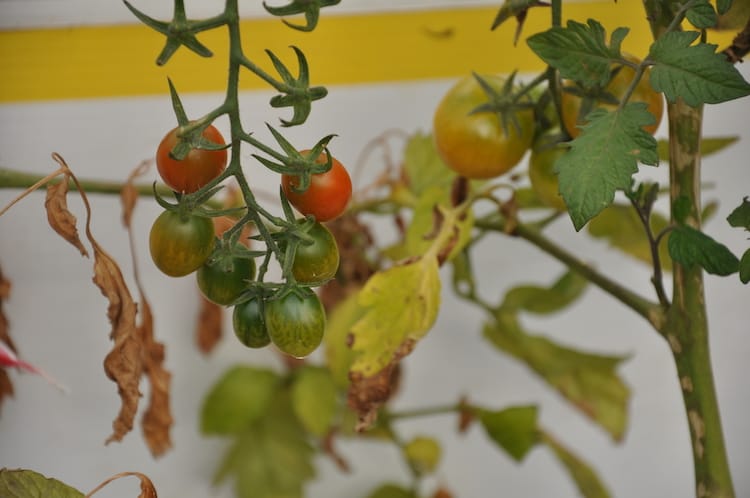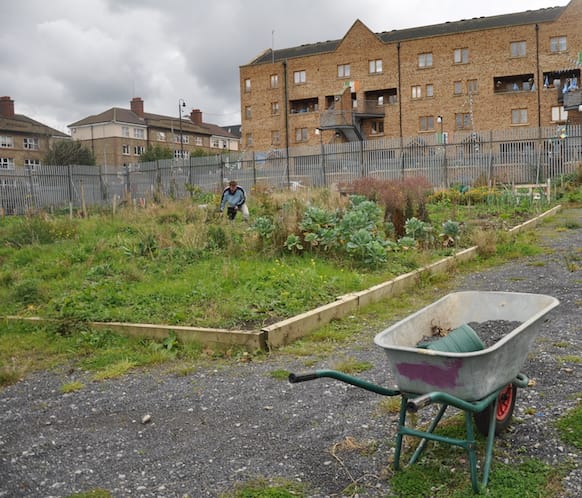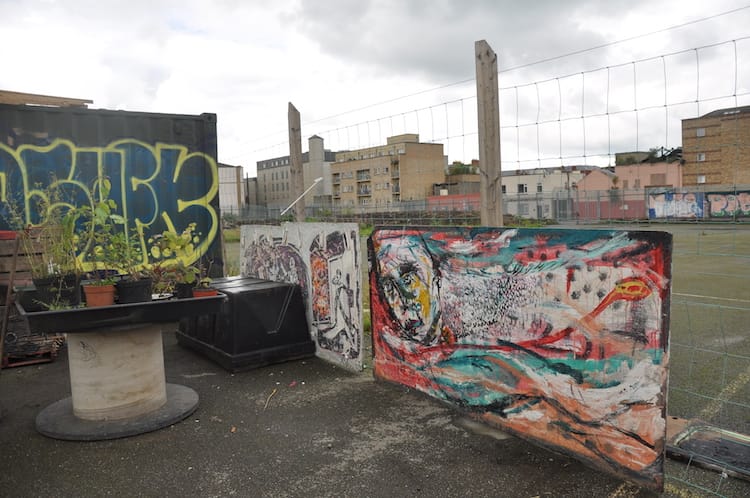What’s the best way to tell area residents about plans for a new asylum shelter nearby?
The government should tell communities directly about plans for new asylum shelters, some activists and politicians say.
There’s a big patch of dirt in the middle of the Bridgefoot Street allotments that Richard Taplin would love to see more groups and individuals use.

Richard Taplin has been working to make the Bridgefoot Street Community Garden more welcoming for a while now, to draw more people in from the nearby flats and further afield.
“We started to do guerrilla gardening, the idea that the garden will spill out into the community,” said Taplin, last Friday morning, gesturing towards the garden’s open gate.
They put plants in the nearby Oliver Bond flats, and he saw some teenagers watering them, the other day. “We’ve started painting the railings, to take the prison look off the place,” he says.
It seems to be working. “I’ve met people in the apartment blocks I’d never spoken to before,” he said.
Now though, Taplin – who helps to coordinate the Liberties Men’s Shed, which is the main group overseeing the garden – is looking for more people and groups to bring on board.

There are 20 allotments around the edge of the garden, some with flowers, some with vegetables. There’s a row of Golden Tassel hops plants.
In one of the most colourful plots, a black-and-white St Piran’s Flag of Cornwall flutters on a bamboo stick. There are sunflowers, a tilted banana tree in the corner, and a small plant with shiny black tomatoes.
There’s also a community garden in the middle, and that needs a bit more love. People seem more comfortable with their own defined allotments than with the shared gardening patch, says Robert Moss, who also gardens regularly there.
Moss, who is green-communities manager at An Taisce, says that it can sometimes be harder to get people to use the shared garden than the defined allotments. “I think that life is so commodified that if they can’t rope it off, they don’t want it,” he said.
It’s certainly not a lack of produce that’s the problem. “With the size of it, there’s enough veg for everybody produced,” he said.
Much of what is in the garden has been salvaged from about the city. Along one side of the fence are tomato plants rescued from the Grangegorman squat after those who lived there had been evicted.
Taplin says he went over with a trolley, loaded it up and wheeled it back. He picked up some granite blocks too.
On Saturday, Taplin is in a corner playing around with some breeze blocks and a grate – piecing together a mini-oven to cook potatoes on at the weekend. He’s working on a bring-your-own-lunch cafe, for people to sit out and eat their own food, too.
In one of the nearby polytunnels is a kind of

mint-planter and composter, which they use sometimes to teach kids. There’s a red watering can lying around, and some old pallets.
They have plans to use all of the salvage, says Taplin, “We had an idea to do a time shop.”
They would fix up things for people, who would barter their time in exchange: two hours of weeding, or an hour watching the gate for garden events. A trade.
Across the garden, Moss was digging up a patch of the community garden, pulling out the leftover potatoes and throwing aside grass and roots, to make way for what will be a wildflower patch.
“This is a good one,” says Moss, admiring a muddy rough-skinned rooster potato. “I’ll take this one home for my dinner.” The grotty potatoes will be set aside to use as seed potatoes for the next harvest.
On Saturday 8 October, Moss and Taplin are inviting people to come and see the garden between 12pm and 4pm, and plan to sow wildflower seeds on the patch, so there will be a colourful meadow in this corner of the community garden come the spring.

There will be lessons for kids in how to make seed bombs, mixing clay and wildflower seeds to throw onto waste ground around the city and brighten it up.
There will also be a talk about why it’s important to make Ireland more pollinator friendly – how bees and bugs need landscapes where they can nest and feed.
Although colder weather is on the way, there are still things that people can do in the garden, said Taplin. There’s still weeding, and some vegetables or flowers need to be planted in the autumn.
“It’s empowering. There’s lots of lads can’t get work, stuck in the gaff,” said Taplin. “Just by doing an activity together, it really clears your mind.”
[CORRECTION: Richard Taplin’s surname was misspelt in an earlier version of this article. Apologies for the error.]
Get our latest headlines in one of them, and recommendations for things to do in Dublin in the other.